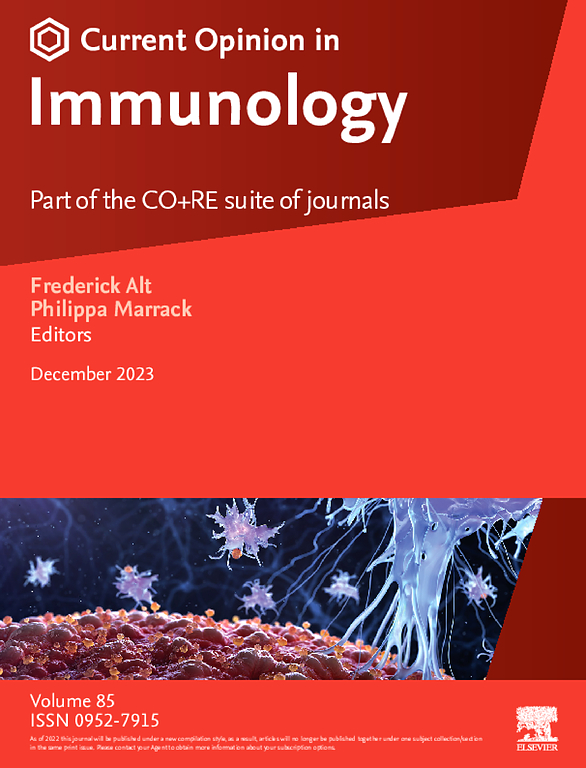“我们能治愈与igg4相关的疾病吗?”
IF 5.8
2区 医学
Q1 IMMUNOLOGY
引用次数: 0
摘要
igg4相关疾病(IgG4-RD)是一种罕见的慢性、免疫介导的全身性纤维炎性疾病,病因不明,可同时或异时累及多器官。虽然致病机制尚不清楚,但可能涉及多种致病因素,如遗传背景、疾病特异性或相关抗原、异常先天或适应性免疫等。许多免疫细胞,包括中性粒细胞胞外陷阱、M2巨噬细胞、浆母细胞、B细胞和T细胞(Th2-CD4+T细胞、滤泡辅助T细胞和CD4+SLAMF7+细胞毒性T细胞)在发病过程中发挥重要作用。对于所有有症状的IgG4-RD活动性患者,推荐使用糖皮质激素或利妥昔单抗联合/不联合免疫调节剂的常规治疗。由于一些随机临床试验,IgG4-RD的综合管理尚未建立。针对B细胞细胞系和CD4+SLAMF7+细胞毒性T细胞的质母细胞靶向治疗方法似乎有希望用于未来的定向治疗。本文章由计算机程序翻译,如有差异,请以英文原文为准。
‘Can we cure IgG4-related diseases?’
IgG4-related disease (IgG4-RD), recognized as a novel clinical entity, is a rare, chronic, immune-mediated systemic fibroinflammatory disorder of unknown origin with either synchronous or metachronous multi-organ involvement. Although the pathogenic mechanism remains unclear, possible multipathogenic factors such as genetic backgrounds, disease-specific or related antigens, and abnormal innate or adaptive immunity may be involved. Many immunocytes, including neutrophil extracellular trap, M2 macrophage, plasmablast, B cells, and T-cells (Th2-CD4+T, follicular helper T cells, and CD4+SLAMF7+cytotoxic T cells) play important roles in the pathogenesis. Conventional therapies with glucocorticoid or rituximab in combination with/without immunomodulators are recommended in all symptomatic patients with active IgG4-RD. Because of a few of randomized clinical trials, the comprehensive management for IgG4-RD has not been established yet. Targeted treatment approaches against the plasmablast to B cell lineage and the CD4+SLAMF7+cytotoxic T cell seem to be promising for the future-directed treatment.
求助全文
通过发布文献求助,成功后即可免费获取论文全文。
去求助
来源期刊
CiteScore
13.30
自引率
1.40%
发文量
94
审稿时长
67 days
期刊介绍:
Current Opinion in Immunology aims to stimulate scientifically grounded, interdisciplinary, multi-scale debate and exchange of ideas. It contains polished, concise and timely reviews and opinions, with particular emphasis on those articles published in the past two years. In addition to describing recent trends, the authors are encouraged to give their subjective opinion of the topics discussed.
In Current Opinion in Immunology we help the reader by providing in a systematic manner: 1. The views of experts on current advances in their field in a clear and readable form. 2. Evaluations of the most interesting papers, annotated by experts, from the great wealth of original publications.
Current Opinion in Immunology will serve as an invaluable source of information for researchers, lecturers, teachers, professionals, policy makers and students.
Current Opinion in Immunology builds on Elsevier''s reputation for excellence in scientific publishing and long-standing commitment to communicating reproducible biomedical research targeted at improving human health. It is a companion to the new Gold Open Access journal Current Research in Immunology and is part of the Current Opinion and Research(CO+RE) suite of journals. All CO+RE journals leverage the Current Opinion legacy-of editorial excellence, high-impact, and global reach-to ensure they are a widely read resource that is integral to scientists'' workflow.

 求助内容:
求助内容: 应助结果提醒方式:
应助结果提醒方式:


